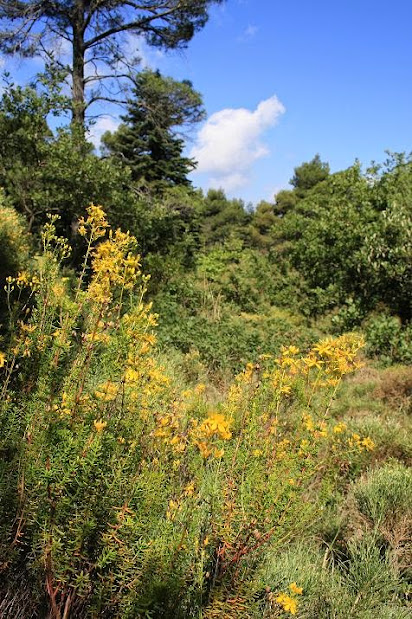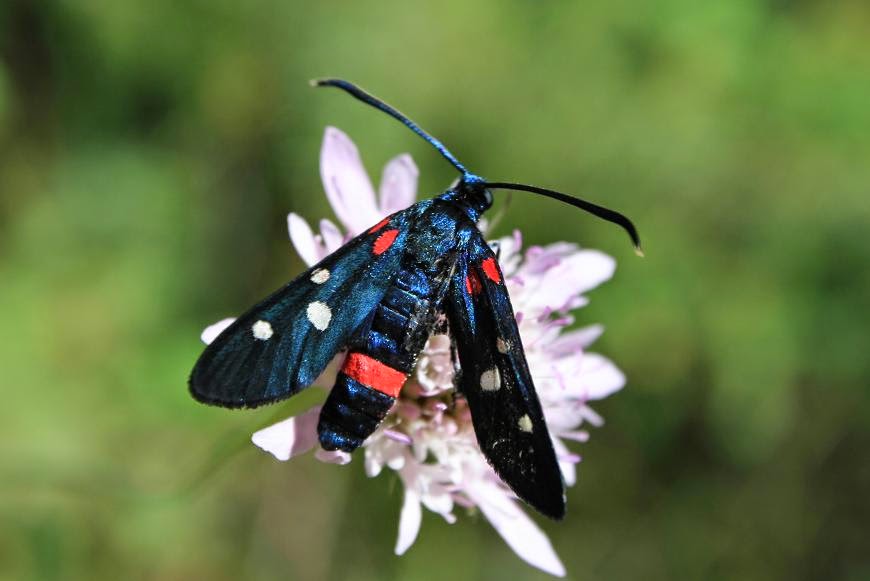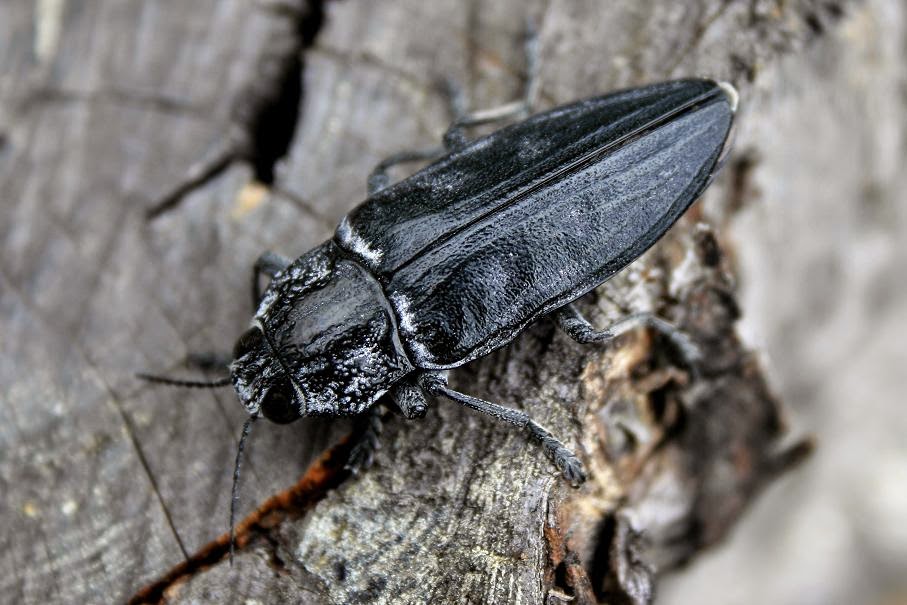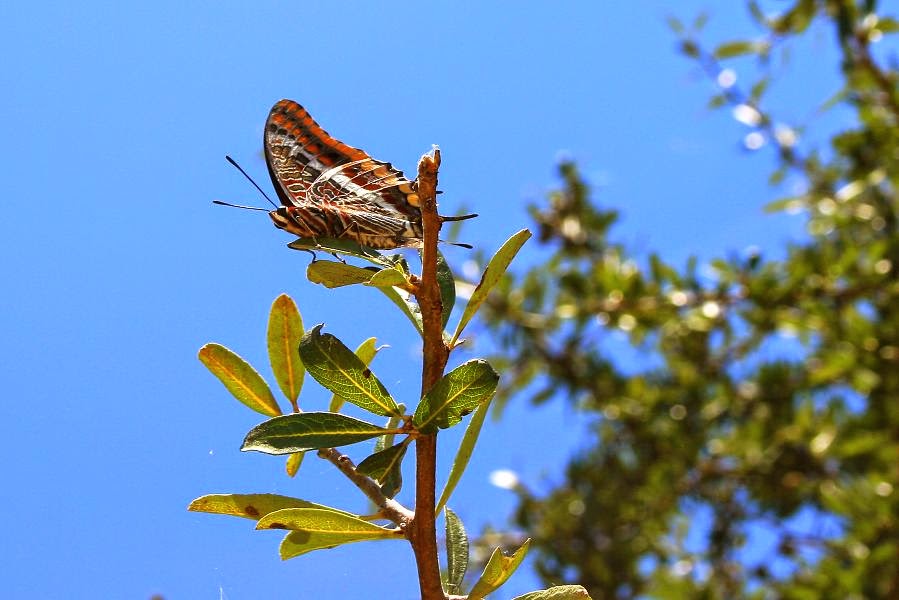One more journey in the year 2014! The first target
was the second biggest island of Greece, which is Euboea. We spent two days on
this island before we drove to our second target, the Peloponnese. Of course,
many species of Jewel Beetles could be found and some other worth seeing insects.
Enjoy!
We started our trip in Athens. In the late afternoon we found a nice village in the north of Euboea and decided to sleep there.
On the way there Anthaxia thalassophila ssp. pseudokervillei Niehuis, 1990 was documented.
The colourful Anthaxia suzannae Théry, 1942 represents the name Jewel Beetle.

Short break to rest.
The second day on Euboea at an altitude of 600 meters we found this nice place to collect. In the foreground flowering Hypericum sp. is shown.
Anthaxia vittula Kiesenwetter, 1857 swarmed around these flowers.
An interesting butterfly: Zygaena ephialtes (Linnaeus, 1767).
On Pistacia sp. the Longhorn Beetle Purpuricenus graecus Sláma, 1993 could be observed.
And Chalcophorella stigmatica (Schönherr, 1817), another Jewel Beetle landed on the leaves.
We left Euboea and drove into the direction of the Peloponnese. On the half of the distance a place with much Phlomis sp. was there. One piece of Trachys pumila (Illiger, 1803) could be found.
Not far away from the coast Acmaeoderella coarctata ssp. seminata (Abeille de Perrin, 1895) sat on a yellow flower.
Our first day on the Peloponnese!
Like an alien: Ephippiger sp. (Tettigoniidae).
Went up into the mountains of Achaia and it was raining…
But two hours later the sun came back slowly.
While the first sun rays fallen to the earth a shiny beetle came out of its hiding place.
Meliboeus episcopalis (Mannerheim, 1837) whose larva living in thistles.
More and more butterflies came out. - Melanargia larissa Geyer, 1828.
Sphenoptera lapidaria (Brullé, 1832). This Jewel Beetle runs on the ground!
The clouds disappear.
Black is beautiful, it can be found in the nature, too. Anthaxia kiesenwetteri Marseul, 1865.
Without words!
Eryngium campestre L. Probably the hostplant of Anthaxia bettagi Niehuis, 1983.
Pseudospinolia cf. incrassata (Spinola, 1838) could be observed.
In springtime this place with Scirpus holoschoenus L. is under water.
Cyphosoma euphraticum (Gory & Laporte, 1839) needs such places to survive.
Very hot and dry place!
Specimens of Acmaeoderella jonica (Obenberger, 1934) were collected with yellow traps.
What a cuckoo wasp! Stilbum cyanurum (Forster, 1771).
Cutted wood like these Pinus sp. is very attractive for many species of Jewel Beetles.
One of the biggest Jewel Beetle in Europe is Chalcophora detrita ssp. marani Obenberger, 1935. They become longer than 3 centimeters.
Small gall on an oak leave (Hymenoptera: Cynipidae) with an diameter of 3 mm! Inside of this gall there is a small larva of a wasp.
Flew high around the trees: Charaxes jasius (Linnaeus, 1767).
Agrilus relegatus ssp. alexeevi Bellamy, 1998.
Forest of the greek fir: Abies cephalonica Loudon.
Anthaxia passerinii (Pecchioli, 1837) on flowers of Leucanthemum sp.
Anthaxia passerinii (Pecchioli, 1837) zoomed in.
Last station was the locus typicus of the Jewel Beetle Lamprodila decipiens ssp. achaica (Brandl, 1986). The larva living in Salix amplexicaulis Bory.
Surprisingly one Lamprodila mirifica (Mulsant, 1855) could be observed on the willow. Probably it came from Ulmus sp. in the surroundings.
We started our trip in Athens. In the late afternoon we found a nice village in the north of Euboea and decided to sleep there.
On the way there Anthaxia thalassophila ssp. pseudokervillei Niehuis, 1990 was documented.
The colourful Anthaxia suzannae Théry, 1942 represents the name Jewel Beetle.
Short break to rest.
The second day on Euboea at an altitude of 600 meters we found this nice place to collect. In the foreground flowering Hypericum sp. is shown.
Anthaxia vittula Kiesenwetter, 1857 swarmed around these flowers.
An interesting butterfly: Zygaena ephialtes (Linnaeus, 1767).
On Pistacia sp. the Longhorn Beetle Purpuricenus graecus Sláma, 1993 could be observed.
And Chalcophorella stigmatica (Schönherr, 1817), another Jewel Beetle landed on the leaves.
We left Euboea and drove into the direction of the Peloponnese. On the half of the distance a place with much Phlomis sp. was there. One piece of Trachys pumila (Illiger, 1803) could be found.
Not far away from the coast Acmaeoderella coarctata ssp. seminata (Abeille de Perrin, 1895) sat on a yellow flower.
Our first day on the Peloponnese!
Like an alien: Ephippiger sp. (Tettigoniidae).
Went up into the mountains of Achaia and it was raining…
But two hours later the sun came back slowly.
While the first sun rays fallen to the earth a shiny beetle came out of its hiding place.
Meliboeus episcopalis (Mannerheim, 1837) whose larva living in thistles.
More and more butterflies came out. - Melanargia larissa Geyer, 1828.
Sphenoptera lapidaria (Brullé, 1832). This Jewel Beetle runs on the ground!
The clouds disappear.
Black is beautiful, it can be found in the nature, too. Anthaxia kiesenwetteri Marseul, 1865.
Without words!
Eryngium campestre L. Probably the hostplant of Anthaxia bettagi Niehuis, 1983.
Pseudospinolia cf. incrassata (Spinola, 1838) could be observed.
In springtime this place with Scirpus holoschoenus L. is under water.
Cyphosoma euphraticum (Gory & Laporte, 1839) needs such places to survive.
Very hot and dry place!
Specimens of Acmaeoderella jonica (Obenberger, 1934) were collected with yellow traps.
What a cuckoo wasp! Stilbum cyanurum (Forster, 1771).
Cutted wood like these Pinus sp. is very attractive for many species of Jewel Beetles.
One of the biggest Jewel Beetle in Europe is Chalcophora detrita ssp. marani Obenberger, 1935. They become longer than 3 centimeters.
Small gall on an oak leave (Hymenoptera: Cynipidae) with an diameter of 3 mm! Inside of this gall there is a small larva of a wasp.
Flew high around the trees: Charaxes jasius (Linnaeus, 1767).
An old oak (Quercus sp.). Into the sunlit dry
branches, the larve of the following Jewel Beetle take its development.
Agrilus relegatus ssp. alexeevi Bellamy, 1998.
Forest of the greek fir: Abies cephalonica Loudon.
Anthaxia passerinii (Pecchioli, 1837) on flowers of Leucanthemum sp.
Anthaxia passerinii (Pecchioli, 1837) zoomed in.
Last station was the locus typicus of the Jewel Beetle Lamprodila decipiens ssp. achaica (Brandl, 1986). The larva living in Salix amplexicaulis Bory.
Surprisingly one Lamprodila mirifica (Mulsant, 1855) could be observed on the willow. Probably it came from Ulmus sp. in the surroundings.





